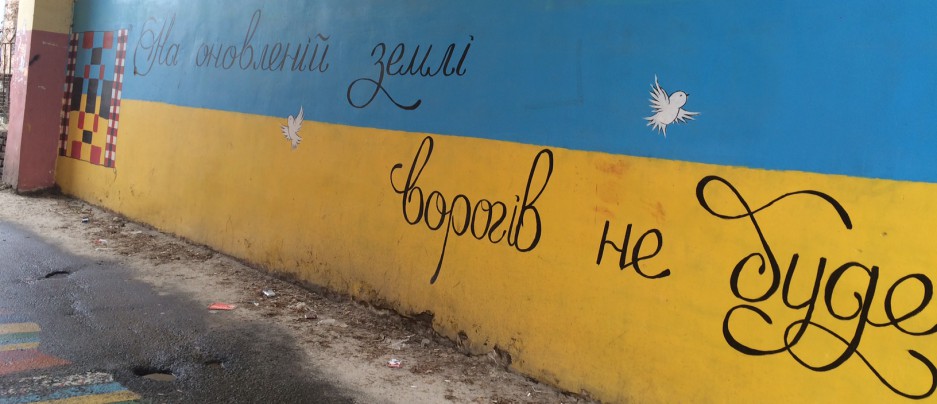In the Bleak Midwinter
It’s February – the beginning of the fourth month of winter here in Ukraine. Ukrainians will tell you there are only three months of winter – they don’t count November or March, since November is considered autumn and March is considered spring, but it still snows quite a lot in both of those months, so for me, they’re also winter.
February is called Лютий (Liutiy) in Ukrainian, which means anything from angry to diabolical or savage. Maybe it’s just the mood I’ve been for the last couple of weeks, but it seems like an appropriate name for this time of year.
For the last two or three weeks, Cherkasy and Chervona Sloboda have been covered in a two-inch-thick coat of ice – and in fact Kyiv was, too, as my friends and I discovered on a weekend trip there. This means that the only way to get around is to sort of shuffle or waddle like a penguin – any time your center of gravity shifts so that it’s not directly over your feet, you’re likely to slip and fall and become the latest casualty of Ukrainian winter.
I’ve gotten to be a bit of an expert at this, and actually haven’t fallen since November. A friend of mine was not so lucky however, and managed to give herself a rather serious injury by falling on the ice. Luckily for us, the Peace Corps medical team is fantastic and they’ve been taking great care of her.
Trying to See from 5,000 Miles Away
The other thing that has me down is watching what is happening in America at a distance of nearly 5,000 miles. As a Peace Corps volunteer, my job is specifically non-political. This means that I should try to avoid speaking about politics with the Ukrainians I interact with on a daily basis. There’s a good reason for this – we are meant to be in service to the Ukrainians in our adopted communities, and if we speak about politics, that could make them suspect that, in fact, our purpose is to somehow influence Ukrainian politics by changing people’s minds, which then makes us agents of the United States government and threatens our mission. I should help people as much as possible, but I should not seek to influence their political views.
On the one hand, this gives me a ready-made excuse to completely avoid the topic of politics – which is great for my sanity. On the other hand, as a sort of cultural ambassador from the United States, I think it’s important to explain the diverse opinions and experiences of Americans. The fact that politics in the United States is actually strongly linked to the safety of Ukrainians gives me another incentive to break my silence and speak a bit about what’s going on in America.
This week, the world was reminded that there’s a war raging on in Eastern Ukraine – violence ticked up and now there’s a town in the midst of a humanitarian disaster, and the world had the courtesy to stop and take notice. For the people I work with and speak with and laugh with every day, this war isn’t some distant reality. It isn’t someone else’s problem. All it would take for every one of them to be in serious danger is for Russia to fully commit to taking on the Ukrainian army and invading the rest of Ukraine. A Russia-friendly president in the White House brings this possibility closer to reality.
If the war were to spread to the rest of Ukraine, all Peace Corps volunteers would immediately be pulled out and sent home – but the Ukrainians who live here would not. All of my students would stay behind – Bohdan, Zhennia and Lilia in the 3rd grade; my 6-year-old and 14-year-old host sisters Katia and Sofia; my incredibly smart and talented 8th-graders, Lera, Aliona and Sasha; my sweet, smart sixth graders Anya, Inna, Denys; our smart and charismatic class president, Makar; and all the rest. How could I sleep at night knowing these wonderful children are in harm’s way?
Give me your tired, your poor, your huddled masses…
Thinking about my children in this grim hypothetical future reminds me of the millions of refugees seeking safe haven around the world. I have so many friends whose families would have been banned from coming to the United States if the “travel ban” had been in place earlier – and many friends who would have been banned themselves. I hope Americans are smart enough to realize that immigrants and refugees are not seeking to bring down the United States or harm its people – they are seeking safety and an opportunity to build a life for themselves and their families.
Refugees in particular are the most heavily vetted immigrants to the United States – it is an incredibly lengthy and intensive process for them to gain entry to the US as a refugee, and there’s virtually no way they could hide ties to or sympathies for terrorist organizations. If Americans would open their arms and their hearts to these people – who are only seeking a safe place to live and an opportunity to work to support their families – we would see our communities enriched and brightened by their diverse experiences and culture.
The United States has a long history of receiving waves of immigrants from different countries – and a long history of rejecting those immigrants at first, only to later realize the value of their contributions to our colorful tapestry of a society. It’s time we take a moment to reflect on that history and hopefully come to the conclusion that these people should be welcomed and helped, not blocked and scorned.












